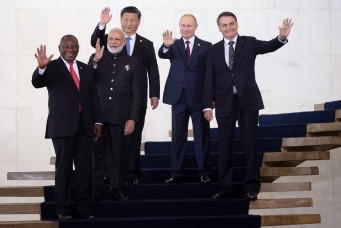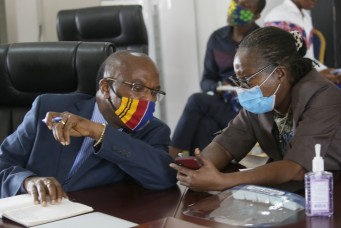Analysis: Can BRICS+ Provide a Counterweight to the West?
With the admission of six new countries, BRICS increases its economic power and global clout, possibly establishing its place as a challenger to the G7.

The BRICS bloc (Brazil, Russia, India, China, and South Africa) started as an economic thought experiment and was meant to consolidate the strengths of the biggest emerging market economies. Since then, it has morphed into a politico-economic counterweight to the G7. The current expansion is more of a geopolitical statement as it seeks to create a more pro-China and pro-Russia institution.
In the run-up to the fifteenth BRICS Summit held in Johannesburg, South Africa, the debate was dominated by three questions. The first was whether Russian President Vladimir Putin would attend in person, given that the International Criminal Court had issued a warrant for his arrest on charges of war crimes. South Africa, as a signatory of the Rome Statute, would have been obliged to arrest him.
In the event, Putin attended virtually, but his physical representative, Russian Foreign Minister Sergei Lavrov, although physically dominating the other BRICS leaders due to his stature, was overshadowed by his virtual boss and in most cases was mute in the events where the media could attend.
Expanding the Bloc
The second question was whether BRICS would be expanded at this summit or whether this would be delayed to next year’s summit in Kazan, Russia. Ahead of the Johannesburg Summit, the third to be hosted by South Africa in the past 14 years, more than 40 countries had indicated that they would like to join BRICS. In the event, some 60 heads of state attended virtually or in person, but only six countries were admitted.
The criteria for the admission of the six was not made public, but five of the six are significant oil and gas producers. In his video link, Venezuelan President Nicolas Maduro highlighted this aspect as he pitched Venezuela’s vast oil reserves.
China was in favour of Iran and Saudi Arabia joining the group, while South Africa named Egypt as its preferred country and Brazil favoured its neighbour Argentina. It was unclear who supported Ethiopia and the United Arab Emirates (UAE) and which countries Russia favored including.
The addition of the six countries has increased the contribution of BRICS to the global economy, adjusted for purchasing power parity, from 30 percent to 37 percent, thereby overtaking the G7.
Challenging the Dollar
The third question was whether BRICS would introduce a financial instrument similar to the International Monetary Fund’s special drawing rights to replace the US dollar as the main currency for international trade.
In a vote in the United Nations General Assembly on December 14, 2022 on the resolution, “Towards a New International Economic Order”, the so-called Western Bloc, consisting of 50 countries, voted against it. A total of 122 countries voted for it.
The resolution said: “By its terms, the Assembly expressed concern over the increasing debt vulnerabilities of developing countries, the net negative capital flows from those countries, the fluctuation of exchange rates and the tightening of global financial conditions, and in this regard stressed the need to explore the means and instruments needed to achieve debt sustainability and the measures necessary to reduce the indebtedness of developing States.”
In 2022, the US, which only has 4.3 percent of the global population, was responsible for more than 60 percent of all current account deficits globally. This means that developing states are concerned of scarce capital being pulled out of their economies by the US. Capital shortages would push states to borrow further at high rates, increasing indebtedness and possibly leading to worse credit ratings and even higher interest rates when borrowing.
Argentina has started using the Chinese yuan to settle part of its International Monetary Fund (IMF) debt, while Bolivia has started using the same currency to pay for imports and exports.
Russia, Venezuela, Iran, Cuba, Zimbabwe and many others that face sanctions from the US are looking for another currency or means of exchange so that they can trade with other countries.
All five current BRICS members and dozens of other developing countries represented at the summit repeatedly called for a fairer world order and the reform of international institutions like the United Nations, the IMF and the World Bank.
United Nations Secretary-General António Guterres said in a speech to the BRICS summit that the calls for reform were valid.
He quoted figures that said, on average, African countries pay four times more for borrowing from international financial institutions than the US and eight times more than the wealthiest European countries.
“Redesigning today’s outdated, dysfunctional and unfair global financial architecture is necessary, but it won’t happen overnight. Yet we can and must take practical action now,” Guterres said.
De-dollarisation will take some time, but like the steady erosion of US dollar conversion into gold, it would most probably take place unseen until there is a sudden collapse.
The BRICS New Development Bank (NDB), for instance, will use the US dollar for roughly three quarters of its annual 6 billion dollar bond issuance, while the balance will be issued in BRICS member currencies.
Just ahead of the BRICS summit the NDB issued its first rand-denominated bond, with over 2.5 billion rands in bids across both the three and five-year tranches. Further issuing of bonds is expected as the NDB said in 2019 that it would issue 10 billion rand worth of bonds in the South African market.
The NDB was also at pains to stress that it was fully compliant with US sanctions on Russia as most of its bonds are US dollar-denominated. This means it has made no new loans to Russia since Russia invaded Ukraine in February 2022.
Diplomatic Flurry
Although the summit was dominated by these three questions, deals were being made in corridors and at stands, as there was a parallel event at Gallagher Estate in Midrand, where some 220 companies were exhibiting their wares.
As South Africa is currently experiencing rolling electricity blackouts, called “load shedding” locally, the news on August 21 by China’s President Xi Jinping that China would donate 167 million rands to South Africa for emergency power equipment and would provide a 500 million rand grant to address load shedding, was very welcome. Around 550 public facilities such as clinics and police stations will get generators, power-supply vehicles and off-grid solar PV energy storage supply systems.
In a similar manner, the news that the Cairo-headquartered Africa Export Import Bank (Afreximbank) was attending its first BRICS summit was also welcomed. After all, the theme of the summit was: “BRICS and Africa: Partnership for mutually accelerated growth, sustainable development and inclusive multilateralism”.
One of the five priorities for the summit was unlocking opportunities through the African Continental Free Trade Area (AfCTA), and the BRICS Business Council had a panel discussion on how to achieve this.
Since its founding in 1993, Afreximbank has provided the financial fuel for the process of economic integration in Africa by directly financing the growth of intra-African trade, investing in trade facilitation, expanding trade-enabling infrastructure, and developing technological ecosystems that leapfrog barriers to intra-African trade and investments. That is why it was the lead sponsor of the two Inter Africa Trade Fairs (IATF) held in 2018 in Cairo, Egypt and in 2021 in Durban, South Africa and is the lead sponsor for the third fair to be held in Cairo in November 2023.
Wamkele Mene, the Secretary General of the AfCFTA Secretariat, said that in order for businesses to fully take advantage of the opportunities provided by South Africa being part of BRICS and Africa, several infrastructure challenges had to be overcome to unlock the opportunities presented by 1.3 billion people with a combined buying power of 3.4 trillion dollars.
A study by the South African Development Community (SADC) secretariat estimated that transport inefficiencies cost African economies 170 billion dollars annually. The study said the lack of harmonisation of standards and regulations was hampering efficient transport flows, which is why the AfCTA was implemented to boost inter-Africa trade.
Though facing challenges, such as political tension between China and India, the BRICS bloc has placed itself at the forefront of the global economic and political discussion with its induction of six new members. Time will tell whether it will establish itself as the dominant economic bloc over the G7 and provide a counterweight to Western influence in the international system.
The United States, however, is not concerned. US national security advisor Jake Sullivan, said that “we are not looking at the BRICS as evolving into some kind of geopolitical rival to the United States or anyone else”. On the other hand, Western mainstream media and think tanks, negligent of the bloc in the past, have taken a strong interest in BRICS and its expansion although Reactions have varied.
Whether it is panned or praised, BRICS+ is an indication that the dialogue between developed and developing nations is changing.
Raja Mohan, a columnist at Foreign Policy and a senior fellow at the Asia Society Policy Institute, writes that Western nations should pay attention.
“The BRICS expansion may be a dud, but it is still a warning shot that the West must end its strategic slumber. The global south is waiting”.




